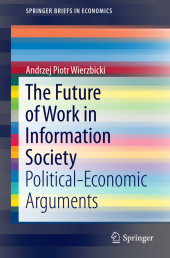 Neuerscheinungen 2016Stand: 2020-02-01 |
Schnellsuche
ISBN/Stichwort/Autor
|
Herderstraße 10
10625 Berlin
Tel.: 030 315 714 16
Fax 030 315 714 14
info@buchspektrum.de |

Andrzej P. Wierzbicki
The Future of Work in Information Society
Political-Economic Arguments
1st ed. 2016. 2016. x, 72 S. 235 mm
Verlag/Jahr: SPRINGER, BERLIN 2016
ISBN: 3-319-33908-7 (3319339087)
Neue ISBN: 978-3-319-33908-5 (9783319339085)
Preis und Lieferzeit: Bitte klicken
This book investigates the question
as to whether technological developments will ultimately mean the end of work
and, if so, what the consequences will be. The author addresses this question
from the perspective of a technologist well versed in econometrics and game
theory, and argues that it is not technology alone that could lead to the end
of work, but its utilization by the capitalist system. Technology allows us to
minimize the costs of work and increase profits, while the system is worsening
unemployment, socio-economic inequality and stratification - which could lead to
the end of capitalism in a massive global revolution.
As
such, the book proposes an evolutionary reform based on a seemingly minor but
in fact essential correction of the corporate income tax, which he proposes
should decrease in accordance with the percentage of the enterprise´s revenues
expended to pay employee salaries. In this way, entrepreneurs will be motivated
to implement new professions and occupations, as well as new workplaces. Only
in this way, the book argues, can reforms be used to prevent the end of work,
which would have catastrophic consequences.
Introduction.- Ethical Premises and Values.- Technical Progress in Economics, Market and Democracy and Informational Revolution.- The End of Communism and the Beginning of an End of Capitalism.- A Vision of Informed Society and a Sustainable Redistribution System.- Who will be Adverse?.- Final Conclusions.
Andrzej P. Wierzbicki is a specialist in automatic control and informatics with over 50 years experience in these fields and wide international cooperation. He also worked closely with economists on such subjects as decision analysis, game theory, econometrics. Since over 30 years he also collaborates closely with the Committee of Future Studies at the Presidium of Polish Academy of Sciences and specializes in long term forecasts.


